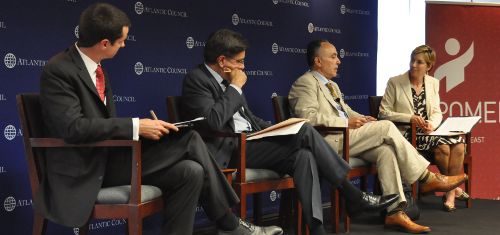Presented by the Atlantic Council’s Rafik Hariri Center and POMED
Thursday, June 21, 2012
Atlantic Council
3:30-5:00pm
Audio footage is available here.
The Supreme Constitutional Court decision invalidating the law under which parliament was elected has thrown the Egyptian political scene into even greater confusion ahead of the second round of the presidential election. Egyptians face a critical moment in a sixteen-month-old political transition that has been shaky at best. Will the presidential election proceed peacefully and will the results be accepted by most Egyptians? How will various forces deal with the prospect of new parliamentary elections? What will the respective powers of the new president and the Supreme Council of the Armed Forces (SCAF) be? How will these developments affect Egypt’s vulnerable economy?
Featuring:
For full event notes, continue reading below or click here for the PDF version
_____________________________________________________________________________
Bahey Hassan opened the panel, strongly asserting that Egypt is no longer in a transition at all “unless we are talking about the growth of the army’s power.” Hassan was particularly critical of the Muslim Brotherhood (MB) for sitting idly by while the Supreme Council of the Armed Forces (SCAF) repeatedly repressed Egyptian protesters with excessive use of force. The result of the MB and SCAF “cooperation against the revolutionary youth” is that the SCAF now has unprecedented powers, the worst being SCAF’s control over the constitution. Hassan claimed, “If the Islamists had been open to working with other actors, the SCAF wouldn’t have taken over.” Now, “it makes little difference who wins, Mohamed Morsi or Ahmed Shafik, because neither will be granted any power,” Hassan said.
Michele Dunne asked for Hassan’s opinion on the Brotherhood’s ability to garner support from opposition parties. Hassan replied that most political leaders (including the Salafists) had no trust for the MB and that whoever becomes president will have trouble with both SCAF and the Egyptian people.
Mohsin Khan talked about the state of Egypt’s economy, which is “clearly in recession.” Egyptian growth has dropped and unemployment has risen since the revolution 16 months ago. Foreign direct investment is virtually nonexistent (compared to $6 billion in 2010) and the deficit is set to exceed $11 billion. Khan described Egypt’s budget, which now has to be approved by SCAF, as “extremely optimistic” in terms of growth and revenue. With regard to the presidential candidates, Khan asserted that there was very little difference between the two as both candidates have “ambitious expenditure plans” with no ideas for increasing revenue. Both Morsi and Shafik also believe Gulf countries will help Egypt to make ends meet, as Qatar has previously promised $10 billion in assistance. Khan pointed out however, that Qatar is currently “being pretty hardnosed;” they expect Egypt to join an International Monetary Fund (IMF) program before sending any aid. Ultimately, Khan concluded, Egypt is going to have to turn to the IMF within the next year or face economic collapse.
Finally, Stephen McInerney wrapped up the panel with a review of United States foreign policy toward Egypt. McInerney was critical of US policy, describing it as a “failure” and “humiliating.” “There seems to be a disconnect” between the administration and SCAF, McInerney argued, citing Secretary of Defense Leon Panetta’s statement affirming that “SCAF is committed to a transition to civilian rule.” McInerny added, “There’s no excuse for [SCAF’s actions] taking the U.S. by surprise.” The United States hasn’t changed its policy from the Mubarak era, according to McInerney, and has also failed to reach out to civil society or political entities other than SCAF and the Muslim Brotherhood. McInerney urged the administration to start applying real leverage on the Egyptian government and said “it can do that through the $1.3 billion in military aid, but also through the IMF.”
In the question and answer session, Bahey Hassan was asked if Egypt’s revolutionary fervor was waning. He replied that the Egyptian youth will continue their struggle and that the last 16 months have absolutely proven that the young generation has strength and determination and is ready to sacrifice for its cause. Hassan added that beyond the youth, average Egyptians attitude toward their government has fundamentally changed as well.

